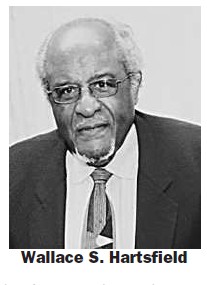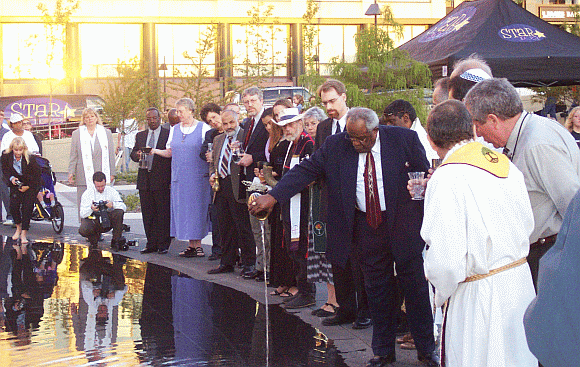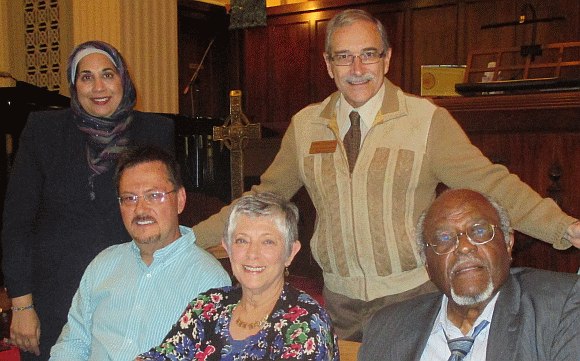|
Wallace Hartsfield
In addition to his civil rights leadership, Dr Hartsfield was a strong voice for interfaith understanding. I first met him about 1976 at B'nai Jehudah when he presented a scholarly discourse there. In the 1980s, I remember visiting his church with teen-agers from New Reform Temple as the rabbi asked me to introduce them to the varieties of faith in Kansas City. After the interfaith Council was formed, I enjoyed visiting his church several times, and when the Protestant seat on the Council was vacant, I invited him to serve on the Interfaith Council. He was a member of the Jackson County 9/11 task force which I chaired. Following the Gifts of Pluralism conference, he contributed a horrific story from his youth in racist Georgia to the play about Kansas City religious diversity, "The Hindu and the Cowboy." While I did not know him well, I was deeply affected by his scholarship, his sense of purpose, and his embrace. I cherish these and other memories and his contributions in many ways of building a community of understanding and mutual regard. --Vern
Dr Hartsfield served on many interfaith
panels -- this one at Central Presbyterian Church on the 2014 annivarsary
of 9/11: Mahnaz Shabbir (Muslim Crescent Peace Society), the Rev
Mike Irwin (Center for Spiritual Living), Rabbi Linda Steigman ( Temple
Adath Joseph), Vern Barnet (moderator), the Rev Dr Wallace Hartsfield (Metropolitan
Missionary Baptist Church.)
from THE KANSAS CITY STAR 2020 January 26
‘‘GROWING UP IN GEORGIA DURING THE
DAYS OF HORRIFIC SEGREGATION AND SEEING MY GRANDFATHER AND OTHER BLACK
MEN TREATED AS NONPERSONS WAS ONE OF THE HARDEST THINGS FOR ME. “I HAVE
LEARNED TO NEVER TREAT ANYONE LIKE THAT. AND I HAVE REFUSED TO LET THOSE
NEGATIVE EXPERIENCES CAUSE ME TO HATE AND TO NEGATIVELY RESPOND TO THE
MAJORITY COMMUNITY. --The Rev. Wallace S. Hartsfield in a 2007 interview
The Rev. Wallace S. Hartsfield, a longtime civil rights leader and preacher in Kansas City, died Thursday at age 90. Hartsfield, dubbed the “Godfather of Ministers” by Rep. Emanuel Cleaver II, was known for holding many posts and engaging in political activism that touched a variety of issues and policies in Kansas City over the years. “He is the minister everyone in town looks up to,” Cleaver said in a 2008 ceremony naming a post office after Hartsfield. “He is a preacher’s preacher.” Hartsfield grew up in the segregated South. During his time as a pastor he was a leader in the African American community and in Kansas City politics. He became known as a bridge builder within the city and advocated for the marginalized and disadvantaged, said Dr. Vernon Howard Jr, president of the Southern Christian Leadership Conference of Greater Kansas City. “Dr. Wallace Hartsfield was a unique clergyman who was able to effectively bridge divides within the African American community and bridge divides across demographics such as race, and culture, and geography. This ability to bridge was in the context of his passion for social justice which included lifting his prophetic voice to dramatize the plight of disadvantaged Kansas citians,” Howard said. While he was most wellknown for his advocacy for the African American community, Hartsfield cared about all people, Hartsfield II. The younger Hartsfield said his father was focused primarily on unity. “He was always concerned about how can we work together in order that all people could reach and realize their creative potential,” he said. “He was never one who — at least from my perspective — that would just put one group above another he was always searching and asking groups how can we work together.” Hartsfield was born in Atlanta in 1929 and grew up in Jacksonville, Florida. In Kansas City, he served as senior pastor at Metropolitan Missionary Baptist Church from 1962 to 1968 and 1972 until his retirement in 2008. Hartsfield served on many local, regional and national boards throughout his career including as chairman of the Congress of National Black Churches, an organization that at the time had over 15 million members nationwide. The United States Congress recognized him for his achievements in 2012. In an interview with The Star in 2007, Hartsfield reflected on the ways growing up in the South shaped his life and career. “Growing up in Georgia during the days of horrific segregation and seeing my grandfather and other black men treated as nonpersons was one of the hardest things for me,” he said. “I have learned to never treat anyone like that. And I have refused to let those negative experiences cause me to hate and to negatively respond to the majority community.” Love, respect, reconciliation and righteousness were among Hartsfield’s guiding principles, his son said. “Even though we disagree we never should feel as if we have the right to disrespect others or degrade or dehumanize others,” Hartsfield II said. Hartsfield II said he remembered many times throughout his childhood when his father would respond to the scene of a crime and cry with a family. And other moments when he would travel with his father in the city or nationally and witness his impact on others. “I was very young, not able to understand everything. One thing I was clear on was people were being helped because I could hear them constantly saying thank you, thank you,” he said. Those close to Hartsfield will remember him for his sense of humor. He was a man, they said, who enjoyed laughing and cracking jokes. Hartsfield II said he believed his father needed “to laugh because there were so many tears in his life and in his work.” “(His) shepherding and care for the least of those who are the most vulnerable in our society that just cannot be overstated and hopefully we will carry that lesson forward,” Howard said. Funeral services for Hartsfield are scheduled for 11 a.m. Feb. 7 at Macedonia Baptist Church, according to his obituary. Katie Bernard:
from THE KANSAS CITY STAR 2020 January 28 Wallace Hartsfield led a charge for history and hope by example BY ROBERT LEE HILL Special to The Star “Loving father, grandfather, great-grandfather.” “A preacher’s preacher.” “Godfather of ministers.” These and many more laudatory appellations can and should be accorded to the Rev. Dr. Wallace S. Hartsfield Sr., who died Thursday at his home in Kansas City. Like Martin Luther King Jr., he was born in Atlanta
in 1929. Like King, his life path would be imbued with consistent
compassion for “the least of these.” And like King, he was an unashamed
advocate for the African American community
I was privileged to know Rev. Hartsfield for a quarter
century; to accept his invitations to work alongside him in racial reconciliation,
voter registration
I was once amazed to see how he and Alvin Brooks quelled potential gang violence in the heart of the urban core. Like legions of other admirers, whenever I was in Rev. Hartsfield’s presence, I felt encouraged about the human prospect. Many will recall his mellifluous enunciation of the word “love” at the end of a sermon, and others will have cherished memories of his sonorous baritone singing “How Great Thou Art” and “I Won’t Complain.” While serving Metropolitan’s congregation for 42 years, he was a stalwart member of the Baptist Ministers Union and the energizing founder of the ecumenical Concerned Clergy Coalition. Health care for all was a central focus for Rev. Hartsfield. He valiantly worked to develop the Model Cities Health Corporation, today known as Swope Health. He assisted in the creation of the Health Care Foundation of Greater Kansas City, now the Health Forward Foundation, when Health Midwest was sold to HCA. And at age 84, as a member of the “Medicaid 23,” he committed civil disobedience in the Missouri State Capitol, urging the expansion of Medicaid coverage for 300,000 Missourians. Rev. Hartsfield’s perduring and prophetic wisdom was marked by twinned themes: history and hope. The importance of history was always part of his guidance for church members and clergy colleagues. And he was also quick to remind everyone of the essential location of hope in the human heart and at the center of any community worthy of the name. One special memory of Rev. Hartsfield’s impact on my life will abide forever. In August 2006, I joined him, Rep. Emanuel Cleaver II and 14 other Kansas Citians on a trip to Turkey sponsored by the Dialog Institute. For 10 days, we enjoyed Turkey’s rich cultural treasures and beheld a vibrant example of different faiths dwelling together in harmony. We experienced the troubled history of the Hagia Sophia in Istanbul, walked where the apostle Paul had walked in Izmir, visited Rumi’s tomb in Konya and reveled in our hosts’ cuisine, music and excessive hospitality. We also trekked through the underground cities of Cappadocia, where, for more than 2,500 years, various populations found safe haven from oppression and marauding armies. Not everyone in our group went down the steps and tunnels, which stretch 200 feet and six stories underground. But who was at the head of the line, challenging the more hesitant (and claustrophobic) of us to follow his lead? Rev. Hartsfield, of course. As he was in Cappadocia, so he was throughout his life: Venturing where others feared to tread. Coursing through ancient pathways, seeking new light. Always trusting an unseen hand to lead him rightly. Always living by the law of love, the power of unfettered truth and an unalloyed affirmation of the dignity of all people. Always knowing that grace would bring him and all of us home. Robert Lee Hill is a community consultant and minister emeritus of Community Christian Church. |

The Rev. Dr. Wallace S. Hartsfield, 90, of Kansas City, MO died on Thursday, January 23, 2020. He was the Retired Pastor of Metropolitan Missionary Baptist Church, Civil Rights Leader and Community Activist. Funeral services Friday, February 7, at 11:00 am at Macedonia Baptist Church 1700 East Linwood Blvd. Visitation Friday 8:00am-11:00am at the church. Body will lie in repose/honor Wednesday, February 5, 12:00 pm-7:00pm at Metropolitan Missionary Baptist Church 2310 East Linwood Blvd. K. C. Community night service Thursday, February 6, at 6:30pm at Macedonia Baptist Church. In lieu of flowers kindly make donations to Metropolitan Missionary Baptist Church Renovation Endeavor. Send condolences to duaneharveyfuneraldirectors@gmail.com or info@metrombc.org Arr: Duane E. Harvey Funeral Directors (816) 763-9100.
The Rev. Wallace S. Hartsfield Sr. Lynn Horsley Rev. Wallace S. Hartsfield Sr., a spiritual and civil rights leader in Kansas City for more than 40 years, died Thursday. He was 90. Hartsfield served as senior pastor of Metropolitan Missionary Baptist Church, one of Kansas City’s largest black churches, from 1962 to 1968 and again from 1972 until his retirement on Dec. 31, 2007. “I have dubbed Dr. Hartsfield the ‘Godfather of Preachers’ because of his vast ministerial knowledge and oratorical skills,” U.S. Rep. Emanuel Cleaver, also a retired pastor in Kansas City, said in a September 2007 tribute to Hartsfield in the U.S. House of Representatives. Wallace Hartsfield II, who succeeded his father as Metropolitan’s senior pastor, said his father was often referred to as Godfather, having had a profound impact through his spiritual leadership in Kansas City. “He’s regarded as being a giant,” he said. “Having said that, I’m not so sure he would really want that title. My father always wanted to be one not so much just in the front of others but more importantly amongst others. So, maybe a giant within.” The elder Hartsfield marched with Martin Luther King Jr., worked with Jesse Jackson on the Operation PUSH campaign to improve economic opportunities for African Americans, and was a nationally prominent black minister. He was involved in countless civil rights, social justice, educational and economic development campaigns throughout his life in Kansas City. Hartsfield grew up in the segregated South, where he witnessed incidents of murderous racism that spurred him to activism. In a 2007 interview with KCUR, he recalled a chilling memory from his childhood. “I was 8 years old, playing in the yard and my great grandmother came out and made me come inside. I saw a pickup truck with a number of Caucasian men in the truck … and behind the truck they were dragging the body of a dead black man that had been hanged and his body had been used as target practice,” Hartsfield recounted. “It’s still painful. I don’t think I will ever be delivered from having seen that.” But Hartsfield did not let those negative experiences fill him with bitterness. Instead, they motivated him throughout his life to fight for a better life for African Americans. His son said Hartsfield Sr.’s best quality was fighting for progress and economic opportunities in the African American community. “I would suggest that your black community, your African American community of professionals that have given leadership since the early 1980s on up to the present, many of them have their positions because of persons like my father who were able to open these doors so they could walk through them,” Hartsfield II said. Civic leaders and members of his church celebrated Hartfield’s life and accomplishments with a grand 90th birthday party for him last November at Metropolitan. Cleaver praised Hartsfield in 2007 as “a minister, dedicated community activist, civil servant, and compassionate role model.” He said those accomplishments were recognized through the renaming of the Parkway Post Office at 4320 Blue Parkway as the Wallace S. Hartsfield Post Office Building. At the official renaming ceremony in January 2008, then-U.S. Sen. Claire McCaskill said Hartsfield was a “big, big deal in the community.” She said that during her time as a Jackson County prosecutor in the 1990s, Hartsfield played a large role in citywide efforts to combat drug houses and drug abuse. Hartsfield was named “One of the Top 50 Ministers in America” by Upscale Magazine of Atlanta and was also a second vice president of the National Baptist Convention of America. In 1998, he was elected board chairman of the Congress of National Black Churches, representing more than 65,000 churches with more than 20 million members. In Kansas City, he served as president of the Baptist Ministers Union. He also helped create the Concerned Clergy Coalition in 1992 to fight crime and to work with Kansas City education and business leaders for better schools and job opportunities. “I believe that economic development in the African American community is the present and the next frontier of civil rights," Hartsfield said in a 1998 interview with The Kansas City Star. "If we don’t have the economic power then we cannot be full participators in the American dream.” He chaired a successful capital campaign in the 1990s to raise millions of dollars to expand and improve the Swope Parkway Health Center, which provided high quality health care services to needy citizens. In 2004, he was appointed to the Missouri Highway Commission by then-Gov. Bob Holden. Reflecting on his life in 2007, Hartsfield Sr. said key accomplishments had been developing housing for low-to-moderate-income people and helping urban core residents become homeowners. “We’ve bought property to build new homes and have helped older persons hold on to their homes,” he told the Star. In a 1995 speech to the U.S. House of Representatives, then-Congresswoman Karen McCarthy of Kansas City lauded Hartsfield for leading efforts to develop the Linwood Shopping Center in the blighted Prospect Avenue corridor. Hartsfield also championed a 60-unit affordable housing development for low income residents, called Metropolitan Homes, in the same area. “He has been a leader in many worthwhile causes and a wonderful role model for our city’s young people,” McCarthy said. Rev. Sam Mann, retired pastor of St. Mark Union Church and a longtime activist in Kansas City’s urban core, said Hartsfield was a “leader unequaled in the civil rights movement and in what he did for his community.” Mann also described Hartsfield as a “magnificent preacher and musician.” “I used to love to hear him preach and would be physically moved,” Mann said in a 2019 interview. Hartsfield was born November 13, 1929 in Atlanta, Ga., and grew up in Jacksonville, Fla. He served a three-year tour of duty with the United States Armed Services in the Philippines before attending Clark College (now Clark University), where he graduated in 1954. In 1957, he earned a master of divinity from Gammon Theological Seminary (now the Interdenominational Theological Center) and went on to lead churches in South Carolina, Georgia, Florida and Wichita before he settled in Kansas City. He married Matilda Hopkins on Aug. 28, 1957 and the couple had four children. Hartsfield was a steadfast voice for doing what was morally right. In a December 2007 interview with The Kansas City Star, he said his goal theologically “has been to be a light, to guide people to the light and to seek to develop this church to being a light.” As he neared retirement, Hartsfield told KCUR that many obstacles remained: “Access to quality education, which helps you move into access to economic justice. Health disparities, the whole matter of crime, the politics of doing what is politically correct rather than doing what is morally right.” Though much more work needed to be done, he said the church had been a crucial agent of progress. “The reason for the church is to bring a word of hope and justice in situations of hopelessness and injustice,” Hartsfield said. “I may not have the power to change things, but I can be a voice for change.” Lynn Horsley is a freelance journalist and was a veteran reporter for The Kansas City Star. Follow her on Twitter @LynnHorsley.
|

